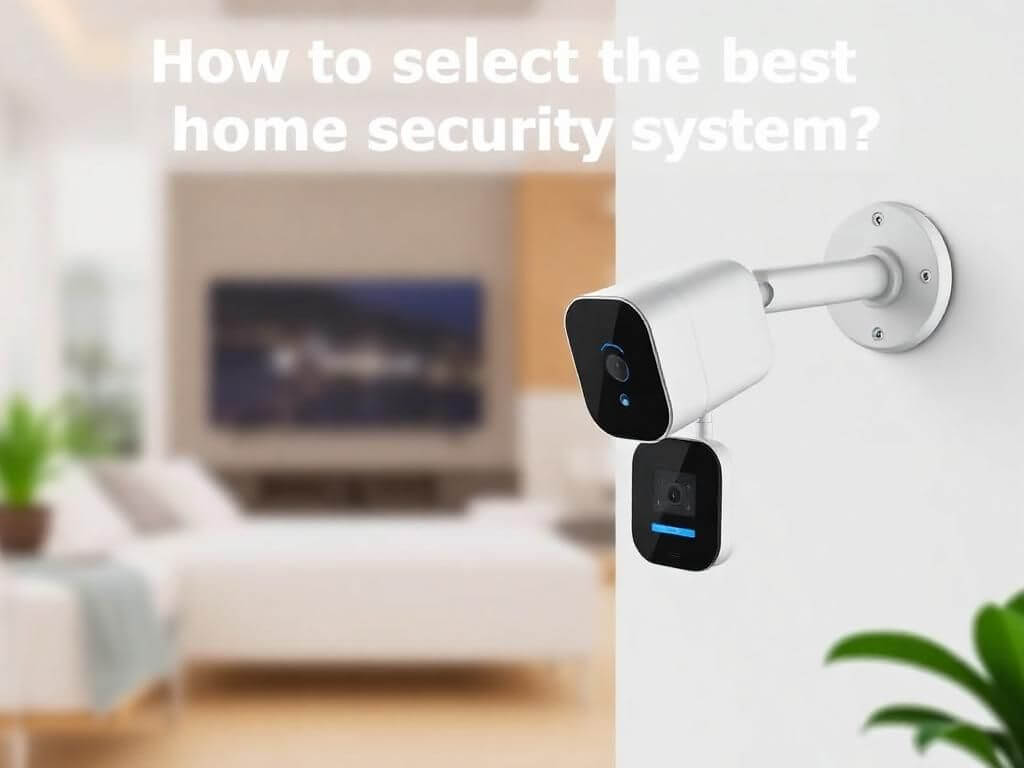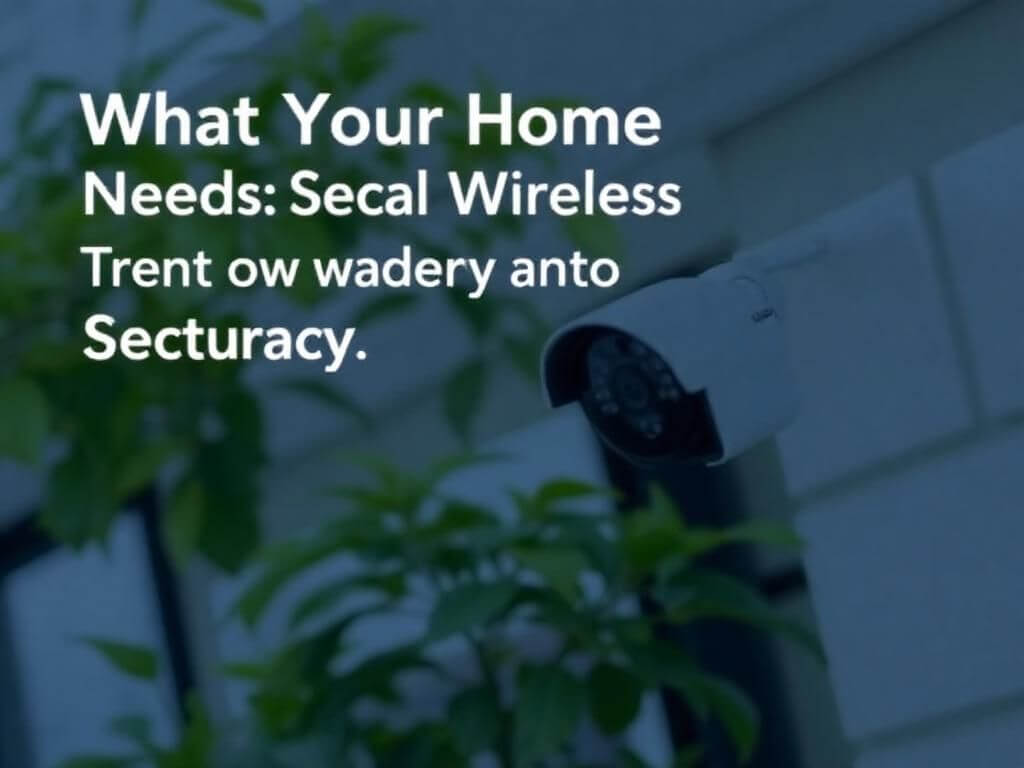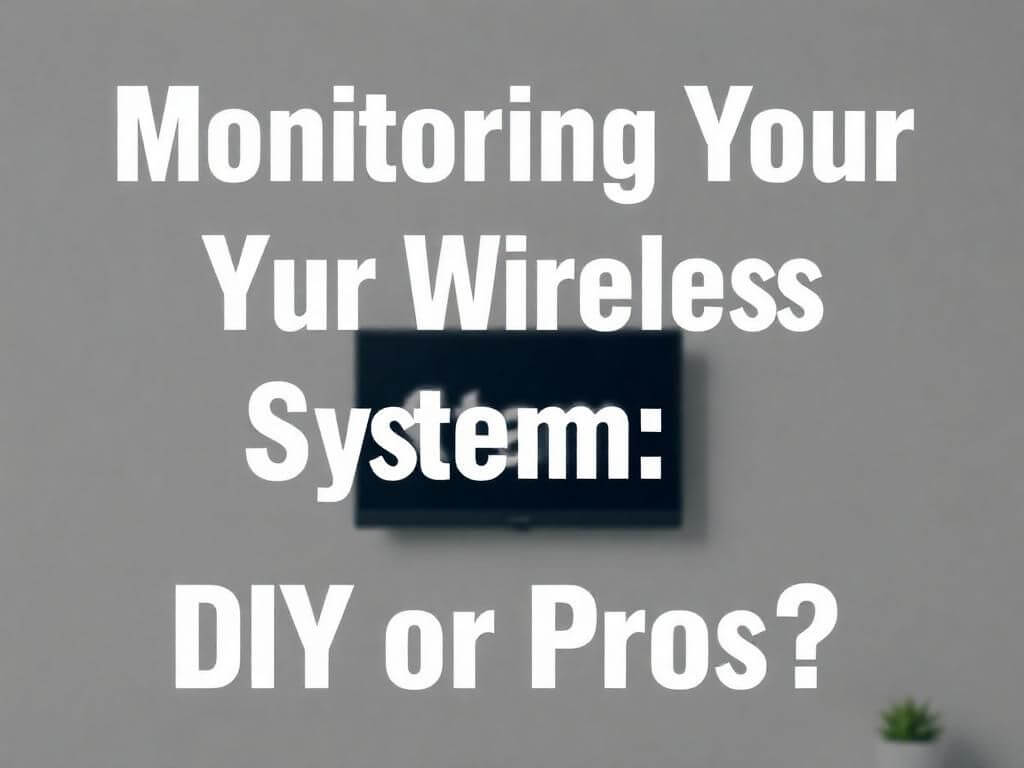Your home is your safe place, and keeping it secure is super important. Forget old, messy wires! Today, wireless home security systems make protecting your space simpler and smarter than ever. These systems give you amazing freedom, they are easy to use, and they help you relax knowing your home is safe. This guide helps you pick the best wireless security system that truly fits your home and your life.

Why Go Wireless? The Big Good Stuff You Get
Many people choose wireless home security now because it just works better for them. Here’s why these wire-free systems are so popular:
- Easy Setup: No need to drill holes or pull wires through walls. Wireless systems often set up quickly, so you protect your home fast.
- Move Things Around Easily: Changed your mind about where a sensor should go? No problem! You just move wireless devices. Your security system changes with your needs, even if you move to a new house.
- Great for Renters: Living in an apartment or a rented house? Wireless systems are perfect. You don’t make big changes, and you take your system with you when you move out.
- Looks Clean and Modern: No wires hanging around means your home looks neater and cleaner. It just looks better!
- Simple to Use: Most wireless security systems come with apps that are super easy to use. You control your whole setup right from your phone, no matter if you are at home or away.

What Your Home Needs: Thinking About Wireless Security
Before you buy anything, think about your home and your daily life. This helps you figure out exactly what your wireless home security system must do.
- Your Home’s Shape: Is your place a small apartment or a big house with many floors? A bigger home needs better wireless range and maybe more devices to cover all areas without dead spots. Make sure your Wi-Fi reaches everywhere you want to put a device.
- Main Entry Points: Walk around your home. Count all doors and windows, including basement doors or sliding glass doors. Any of these could be an entry spot, so you want to protect them with wireless sensors.
- How You Live: Your daily habits matter a lot.
- Do you travel a lot? If yes, you need a system that lets you check on your home reliably from anywhere using your phone.
- Do you have pets or kids? Look for wireless motion sensors that ignore pets. This stops false alarms when your dog or cat runs around. Systems that are easy to turn on/off also help busy families.
- Want simple alerts or full smart control? Decide if you just need messages when something happens, or if you want your security system to talk to smart lights, thermostats, and other smart gadgets.
- Your Budget: Think about how much money you want to spend. This includes the first cost for all your wireless security equipment and any monthly fees for monitoring or storing videos. It’s like buying a phone: you pay for the phone and then a monthly plan.
Key Parts of Your Wireless System: What You Need
A strong wireless home security system has special parts that all work together to keep you safe. Here’s what you usually find:
- The Wireless Hub (Control Center): This is the main brain of your wireless setup. It connects all your wireless devices, gets their messages, and sends out alerts. It controls everything.
- How It Connects: Most hubs use your home’s Wi-Fi. But find one with cellular backup (like a tiny phone inside!). If your internet stops working, this backup keeps your system online and sends alerts. This is very important for reliable wireless security.
- Wireless Sensors: Your Home’s “Eyes and Ears” These small, battery-powered devices find trouble without any wires.
- Door and Window Sensors: You put these small parts on door frames and the door itself. If someone opens a door or window when the alarm is on, they immediately tell your hub.
- Motion Sensors: These find movement in a room or area. Many advanced wireless motion sensors are “pet-friendly,” so they ignore small animals and don’t set off false alarms.
- Glass Break Sensors: They “listen” for the sound of glass breaking. They quickly tell you if someone smashes a window, even if they don’t open it.
- Environmental Sensors: Don’t just think about thieves! Wireless smoke detectors, carbon monoxide (CO) detectors, and flood sensors can stop bigger problems. They send alerts right to your phone or a monitoring station if they find danger.
- Wireless Security Cameras: See What Happens These cameras let you see your property, whether you are at home or away.
- Inside vs. Outside: Outdoor cameras need to handle bad weather. Indoor cameras are smaller and hide better inside.
- Power Options: Many wireless security cameras use batteries, so you can put them almost anywhere. Others plug into a wall.
- Smart Features: Look for clear video (1080p is good, 4K is even better), night vision to see in the dark, and two-way talk to speak with visitors or scare off bad guys. Most let you save videos to the cloud or a local storage card.
- Wireless Alarms & Sirens: If someone tries to break in, a loud siren goes off right away. This strong noise often scares off thieves and tells neighbors something is wrong. These wireless alarms link with your system to make a big warning sound.
- Smart Locks & Video Doorbells: These are often key parts of a wireless security system.
- Smart Locks: These connect without wires (often using Z-Wave or Wi-Fi) to your system. They let you lock/unlock doors with your phone, a keypad, or even your voice. You can give temporary codes to visitors and get messages when someone uses the lock.
- Video Doorbells: These popular devices record video of your front door area and connect to your Wi-Fi. They let you see and talk to people at your door from your phone, anywhere, and send alerts for movement or package drops.

Monitoring Your Wireless System: DIY or Pros?
After you set up your wireless home security system, who watches it? This big decision changes how you react to problems and how much peace of mind you get.
- DIY Wireless Home Security Monitoring: You become the one watching everything.
- Good Points: You don’t pay any monthly fees for someone else to watch. You control all the alerts (like phone messages) and decide what to do. This saves you money!
- Things to Know: You must always be ready to check your phone and act fast. If you miss an alert (maybe your phone is off, or you’re asleep), no one else knows about the emergency. The system will not automatically call police or fire for you. You are responsible for everything.
- Professional Wireless Security Monitoring: A special company watches your system all day, every day.
- Good Points: Trained people are always watching your home. If an alarm goes off, they quickly check (sometimes with your cameras) and then immediately call emergency services (police, fire, ambulance) if needed. This means help arrives much faster. This gives you true peace of mind, especially when you are away from home.
- Things to Know: This service costs a monthly fee. While they handle emergencies fast, you have less control over the first few moments of an alert compared to watching it yourself.
Wireless Installation: Can You Do It Yourself?
One of the best things about wireless security systems is how easy they are to put in.
- DIY Wireless Security Installation: Most wireless systems are made for you to set up on your own.
- Benefits: You save money because you don’t pay for installation. You put it in when you want, exactly where you want.
- What You Need: You should feel comfortable with technology and follow instructions. I put in a popular wireless system myself, and it took less than an hour for the main parts. It was really easy.
- Professional Wireless Security Setup: You can still hire experts to install your wireless system.
- Benefits: Experts do all the work. They make sure every device is in the right place and works perfectly, especially in bigger or more complex homes. This means your system works great from the first day.
- When to Think About It: If your home is very big, you have many devices, or you just prefer not to do it yourself, professional installation can be worth the extra cost. Some advanced systems or certain monitoring plans might even require it.
Smart Home Connectivity: Making Everything Talk
A truly “smart” wireless home security system does more than just protect; it connects with your other smart devices. This makes your home safer and smarter.
- Connect to Your Smart Home Systems: Does the security system work with popular tools like Amazon Alexa, Google Assistant, or Apple HomeKit? Look for systems that can easily connect to these.
- Benefits: You control your security system with your voice (“Alexa, turn on the alarm!”). You also set up automatic actions, like having smart lights turn on when a motion sensor goes off, or doors lock automatically when you arm the system. This makes using your smart home super easy.
- Wireless Standards Are Important: Device Compatibility: Make sure all the different wireless devices you pick (sensors, cameras, locks) can actually talk to your main security hub.
- Main Standards: Many systems use common wireless rules like Z-Wave or Zigbee. These are important because they let devices from different brands connect to your security system. This gives you more choices for adding new smart gadgets later.
- Control from One Place: The goal is to control your security, lights, thermostat, and other smart devices all from one simple app. This stops you from needing many different apps and makes your system much better.
Key Things to Think About for Your Wireless Choice
Beyond the basic features and setup, some important points help you pick the very best wireless home security system for a long time. These affect how you use it every day and how well it protects you.
- Battery Life for Wireless Devices: This is super important for wireless systems! How long do the batteries in your sensors and cameras last? You don’t want to change them all the time. Look for devices with batteries that last a long time (often years for sensors, or months for cameras depending on how much they are used).
- Wireless Range and Coverage: Will the system’s wireless signal reach every part of your home without areas where it doesn’t work? Bigger homes or homes with thick walls might need extra devices to extend the signal. Check wireless security system reviews to see what other users say about how far the signal reaches.
- Reliability (Does it Always Work?): Your security system must work exactly when you need it most. Check the brand’s reputation for working steadily, not sending false alarms, and staying connected. Look for systems that have good internet and cellular backup. A system that often stops working is not helpful.
- Privacy and Data Security: How does the company protect your personal information and your camera videos? Look for strong ways to keep your data safe, like encryption and two-factor authentication. Make sure their privacy rules are clear. You want your data to be safe.
- Customer Support and Warranty: What if you have a problem? Good customer help is very important for fixing issues. Always check the product warranty to see what happens if something breaks. A good warranty gives you peace of mind.
- Can You Add More Later? (Scalability): Your needs might grow. Can you easily add more wireless sensors, cameras, or other smart devices to your system in the future? A system that lets you grow means you can add more protection as your family or home needs change.
Conclusion: Pick the Best Wireless Security for Your Home
You’ve learned everything, from understanding what your home needs to checking wireless parts, monitoring options, and smart home connections. You now have a clear plan for choosing the best wireless home security system.Remember, there is no single “perfect” system for everyone. The right choice is the one that fits your home, your way of life, and your budget. Use all this information to pick a system that gives you strong, wire-free protection and brings you lasting peace of mind. Take control of your home’s safety today!

Unlock the full potential of your smart home device. Learn how to connect, automate, and optimize your smart devices for a seamless and convenient lifestyle.
